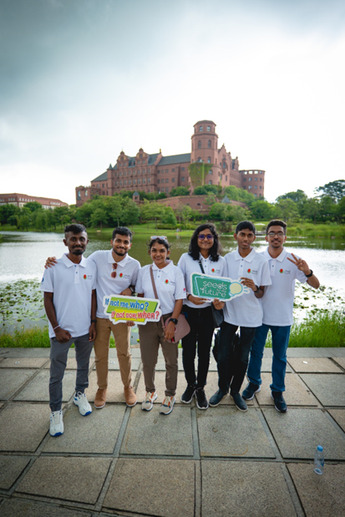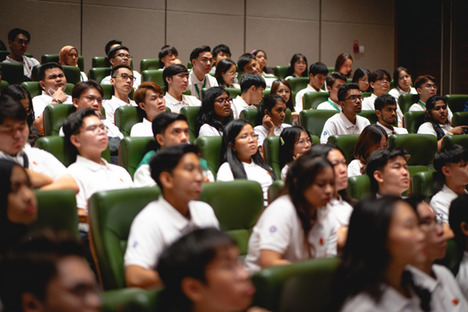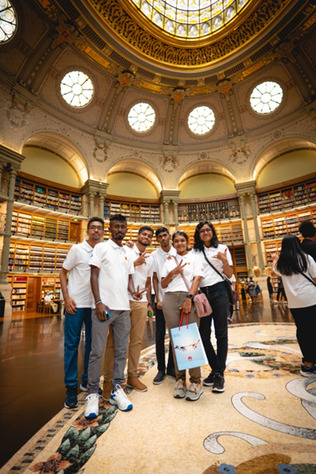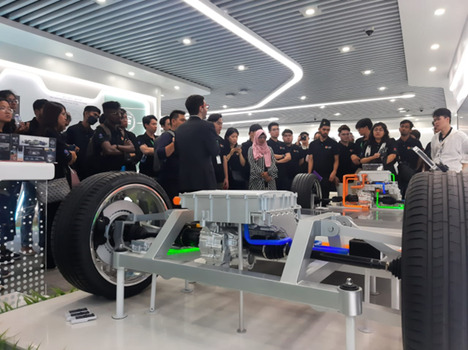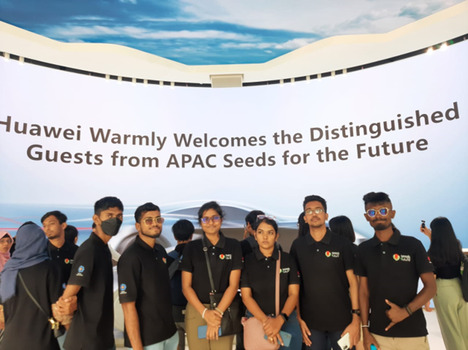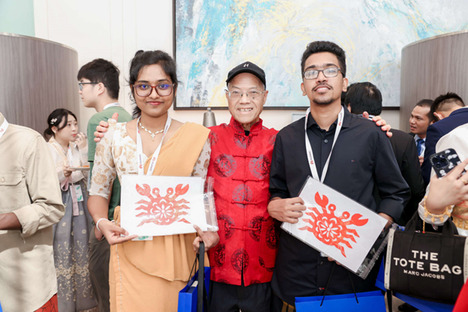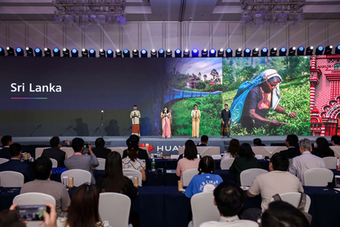The importance of cutting-edge technology and cultural understanding cannot be overstated in an increasingly interconnected world. Recognizing this, and with the goal of providing the opportunity to learn cutting-edge ICT technologies, Huawei’s Seeds for the Future Program 2023 selected a group of four undergraduates from Sri Lanka, who were chosen by the Ministry of Education, to embark on a study trip to Huawei Headquarters in Shenzhen, China.
The four students traveled to China as part of the Seeds for the Future tour, which included 91 Seeds from 19 Asia Pacific countries.
What is Huawei’s mission?
Huawei’s flagship corporate CSR program is Seeds for the Future. It provides an important platform for understanding industry innovation, experiencing cross-cultural exchanges, and cultivating an entrepreneurial spirit by selecting young talents from Sri Lanka to participate in short-term trainings and global competitions. The program’s core values are national diversity and inclusivity, and it has committed to a participation rate of at least one-third for female students.
Sri Lanka’s Seeds for the Future program history
The ‘Seeds for the Future’ program was launched in Sri Lanka with the goal of developing local ICT talent and facilitating ICT knowledge transfer to assist Sri Lanka in becoming a digitally empowered nation. To select outstanding students for the program, Huawei worked closely with ministries, state departments, universities, and authorities.
In collaboration with the Ministry of Telecommunications and Digital Infrastructure, Huawei launched the program in 2016. At that time, Huawei fully funded ten Sri Lankan university students’ study trips to China.
Huawei is grateful that more than 80 promising young Sri Lankan students have already joined the program. The program sponsored selected candidates from Sri Lankan universities for the ICT training and cultural trip for seven years in a row.
The program recently welcomed its eighth batch, which included four students from the Universities of Kelaniya, Jaffna, and Colombo.
The study trip to China
The four students witnessed the most recent advancements in artificial intelligence, robotics, and the Internet of Things (IoT), and they had the opportunity to interact with experts who explained the potential impact of these technologies on various industries, fostering students’ curiosity and inspiration.
A day of Inspiration at Huawei’s R&D Base and Beyond
The first day began with hope and excitement. The students first went to the EBG Descartes Exhibition Hall, then had a technical discussion with an ICT expert, then went to Xiliu Beipo Village – Huawei Dongguan R&D Base, Huawei South Factory – Solar PV, and finally Huawei University and the Library.
Tech Talk with Dr. Bo Bai on Information Theory
The tour began with an exciting tech talk with Dr. Bo Bai, Information Theory Scientist and Director of Theory Lab Huawei. Students learned about classic and post-Shannon information theory, B5G/6G mobile networking, and graph informatics.
Helani Seekkubadu, a University of Kelaniya student, shared her thoughts, stating that their visit to the Shenzhen EBG Exhibition Hall was eye-opening and that the tech talk with Dr. Bai was a fantastic opportunity for her to learn about information theory. “As a Sri Lankan Software Engineering Undergraduate, I had no idea what the Information Theory was. I’d heard and seen it in books, but I didn’t have the necessary knowledge of what it was. I’m grateful for the opportunity to attend the lecture and learn about information theory. I learned that we put forward a coding method based on multilateral coupling graphs in the field of information theory,”
The students then visited the Xilliu Beipo Village – Huawei Dongguan R&D Base, the Huawei South Factory – Solar PV, and the Huawei University and Library. They saw how Huawei works actively with grid operators and other partners to provide safe and dependable energy solutions.
Huawei South Factory – Solar PV
In the field of solar PV, Huawei offers a complete solution at every level, be it residential, community, corporate, or utility scale.
“With utility-scale PV, Huawei is paving the way to 100% renewable energy. Huawei has always prioritized the long-term performance of the PV power plant on its path to 100% renewable energy penetration. One of the most important things I noticed in Shenzhen is that it is a city that is quickly emerging in terms of the transition to electric vehicles. Decarbonization of the transportation sector is as important as decarbonization of electricity grids, and Huawei is also at the forefront of this transition,” Shanilka Haturusinghe from the University of Kelaniya said.
Huawei University/Library
Students were then taken to Shenzhen University Town and shuttled around the university, which covers a large area filled with trees, mid-sized buildings, and lakes.
Haturusinghe who called the university the Europe said that, “The Huawei Ox Horn Campus, a European-themed village on the shores of Songshan Lake, is like visiting Europe. No employees would be bored if they came to work here because they are not going to work in skyscrapers with cement buildings and traffic. Instead, Huawei has created human spaces that are in relaxed harmony with the environment and serve as a counterpoint and release from work pressures. I discovered that this is primarily due to Huawei’s founder Ren Zhengfei’s parents being teachers,”
Huawei buildings include replicas of castles from Germany, Paris and Oxford. The zones are linked together by a tram system, which serves as the primary mode of transportation on campus
A Day of Learning and Exploration at Huawei’s Innovation Centers
The day was productive, and students returned home with a wealth of information. The following day, the students went to the Galileo 5G Exhibition Hall. The Digital Power Innovation Center, the ADN Exhibition Hall, and the G Zone Huawei Flagship Store were next.
The Galileo Exhibition Hall
The Galileo Exhibition Hall, located at Huawei’s headquarters in Shenzhen, was named after the ‘Father of Modern Science’, Galileo Galilei, and is inspired by his groundbreaking achievements in science and technology.
Taking there, the students were shown how the latest technologies are being used to develop a wide range of industrial and business applications, including Smart Cities, New Smart Media, Smart Health, Urban Safety, and Smart Education.
“Exploring the Galileo 5G exhibition hall was an eye-opening experience that revealed the breadth of Huawei’s innovations. Smart Cities improve city management and promote technological innovation by utilizing advanced technologies such as 5G, AI, IoT, cloud computing, and big data analytics,” Haturusinghe said.
Digital Power innovation Center
Following that, the students were taken to the Huawei Digital Power Innovation and Experience Center, where they learned about Modular+Smart, Leading Industry Revolution, Smart Medium and Large Modular DC, Smart Edge Data Centre, and Smart Cooling Solutions.
Intelligent Automotive Solution 2030
The automotive industry and solutions were a major focus of the visit, as Huawei aims to bring digital to every vehicle in the future in order to empower intelligent driving, intelligent spaces, intelligent services, and intelligent operations.
Huawei’s plans to bring decades of ICT expertise to the automotive industry as a supplier of new components for intelligent connected vehicles were shared with students.
“As vehicles become more electric and intelligent, I learned that Huawei wants to help carmakers build better vehicles,” Thedsanamoorthysarma Thanushika, a University of Jaffna student, said after a Q&A session with a Huawei expert.
“To provide superior safety in intelligent driving, Huawei uses sensor fusion technology. Sensors such as lidars, mmWave radars, ultrasonic radars, and cameras are used to aid in the fusion and reconstruction of multidimensional environmental data. Huawei’s HarmonyOS for Automotive creates a seamless experience across nearby devices, making it easier and more comfortable for users to interact with their devices,” she explained.
Chinese Cultural Experience
Knowing other cultures, including Chinese culture, is important for everyone, regardless of nationality or background.
The students were taken to the Shenzhen Splendid China Folk Culture Village and the Shekou Sea World. A presentation on Chinese culture was given to students, which included a brief history, art, traditional music, and a taste of Chinese cuisine.
Chanaka Bandara from the University of Colombo said that learning about Chinese culture helped him appreciate the diversity and richness of the world’s cultures, fostering a more inclusive and tolerant society.
“China is an economic powerhouse on a global scale. Knowledge of Chinese culture, language, and business etiquette can be beneficial for Sri Lankan students who want to become entrepreneurs or do business in China. This understanding assisted me in resolving misunderstandings and conflicts reported by third parties,” he said.
A Cultural and Architectural Day
APAC Talent Summit 2023
The students arrived at the APAC Talent Summit 2023 in traditional attire, greeting the audience on the main stage on September 19, 2023.
The girls dressed in a half-saree and an Osari, representing Sri Lanka’s Tamil and Sinhala women’s traditions. The boys, on the other hand, were dressed in sarong suits to represent the cultural tradition for men in Sri Lanka.
They were all Sri Lankan, not only in costume but also by gesture. That day, they said ‘Ayubowan and Wanakkam’ to everyone, which was a symbolic gesture for the occasion.
But it wasn’t just their clothing that alluded to their Sri Lankan ancestry. ‘Ayubowan and Wanakkam,’ a harmonious symphony of two languages and a profound gesture that bridged the divide, uniting us all on that special day, echoed in their hearts.
Exploring Shanghai’s Rich Tapestry
Following the APAC talent summit, the students visited the Bund, Shanghai World Financial Center, Shanghai Tower, French Concession, Tian Zi Fang, and Zhujiajiao Ancient Town Tourist Center, as well as the Pudong waterfront, the financial district across the Huangpu River, and the long stretch of colonial buildings lining the waterfront.
Strengthening Sri Lanka’s ICT Landscape
Sharing his thoughts on the study tour, Huawei Sri Lanka CEO Tao Guangyao said, “I hope that the students have returned home with a wealth of knowledge and experiences that will undoubtedly shape their educational paths and the future of Sri Lanka. We chose the students and sent them on the study tour in the hopes of inspiring and nurturing the next generation of leaders in Sri Lanka. The study tour has planted the seeds for a more interconnected world. I hope that all of the students who participated representing Sri Lanka will put the experience and discoveries they saw at Huawei’s headquarters into practice in Sri Lanka. Serving our local commitment, In Sri Lanka For Sri Lanka, we are committed to developing local ICT talent and improving the country’s competitiveness. We are dedicated in enabling digital transformation and contributing to economic revival,” he said.
“Since the program’s inception in Sri Lanka in 2016, over 80 Sri Lankan university students have participated and traveled to Thailand, Singapore, and China to study cutting edge ICT. As a result, we are looking forward to cultivating more talents to support economic growth through cutting-edge ICT solutions, while also bridging the digital divide and enhancing local ICT Talents. All the best dear students,” he wished.
Photo captions:

